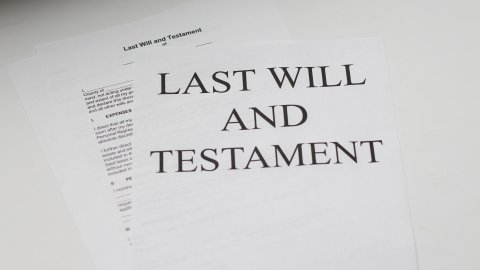“I live with my partner - what happens if one of us dies?”

Most of us acknowledge the importance of making a Will; if you cohabit with a partner, the implications of not having a Will in place can be devastating.
To put it frankly, cohabiting couples are not offered the same protection under the law that is enjoyed by married couples or civil partners. If you die intestate (without a Will) your assets pass under the Intestacy Rules, a list set out by the government dictating how your assets will be distributed on your death. Cohabiting couples have no right to inherit under the Intestacy Rules, as the law does not recognise an unmarried partner or ‘common law’ spouse.
There is no automatic right for cohabiting couples to benefit from each other’s estate on death, irrespective of the duration of the relationship. If you have a Will in place, however, this will ensure that your assets pass in accordance with your wishes - and you can guarantee that your partner inherits, when they otherwise would have no right to.
In certain circumstances, a surviving cohabiting partner may be able to claim for maintenance from their partner’s estate under the Inheritance (Provision for Family and Dependents) Act 1975. Such potentially costly litigation and uncertainty can be avoided by having Wills in place.
Without a Will, there are no appointed Executors to deal with the estate; in this situation, Rule 22 of the Non-Contentious Probate Rules sets out the order of priority as to who can administer the estate. This is the same order of priority as the right to inheritance under the Intestacy Rules, so an unmarried partner will not have the right to deal with the estate or the funeral.
If you are living with your partner in their home and it is owned in their sole name, you will not be entitled to remain living there following their death, as the home will pass as part of their estate to their closest relatives, in accordance with the Intestacy Rules.
Equally, if you co-own your property together as ‘tenants in common’, there is no automatic right for you to either inherit or continue to live in the property owned by your partner following their death. If there were no Will, the surviving partner would then co-own the property with the deceased’s family. Many couples choose to insert what is known as a Life Interest Trust into their Wills, which allows the survivor to continue living in the property until their death, but ring-fences their own share of the capital for their chosen beneficiaries (eg their children or family). It should be noted that if a property is owned as ‘joint tenants’ then it automatically passes to the survivor of you on the death of one party.
Whilst some couples choose to use joint bank accounts to deal with household expenses, many keep their finances separate. This can cause practical problems on someone’s death, because banks put a stop on any sole bank accounts when notified of a death, potentially leaving the surviving cohabitee short of finances to meet outstanding joint household liabilities - and direct debits for utility companies cancelled. In contrast, joint bank accounts will pass automatically to the survivor on the death of one party, so can be a useful way of mitigating these problems.
Whilst this article is not focussed on tax consequences it is worth noting that any assets passing to spouses and civil partners on death are free of Inheritance Tax. This is an extremely useful exemption; there is no similar tax relief for cohabitees.
Finally, it’s important to note that if you do get married or enter a civil partnership and you already have a Will in place, unless your Will was specifically made in contemplation of the marriage or civil partnership, it will have been revoked by the marriage or civil partnership - and you will be back to being intestate. You will therefore need to make a new Will. This is also a good time to review whether your wishes have changed…
In conclusion, there are lots of considerations that need to be taken into account when couples cohabit, as you are afforded very little protection under the law. If you have any questions on the issues in this article, or you wish to discuss making Wills, please give me a call on 01603 724688 or email me on cvnelson@cozens-hardy.com.
